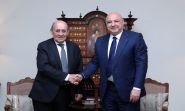
The riddled negotiations taking place in Lebanon and Gaza and the equivocations of the Syrian transition are quite compelling since they convey the ambiguities undermining political stability in these different environments. Nonetheless, they illustrate the difficulties of political transitioning in countries partially or totally controlled by Islamist groups with meandering political agendas.
We should not fool ourselves over their liberal and democratic velleities because there are none. Their political simulations are mere tactical maneuvering to deflect political pressure, consolidate political footholds and ultimately sabotage any political dynamic that may question their control. The inherent ambiguities are here to stay unless the geostrategic and political dynamics change.
Lebanon’s main dynamics are decipherable since the country has faced, throughout the last 66 years, an enduring challenge to its political stability, targeting mainly its national legitimacy and political and civic culture, whatever might be the vehicles and modulations. It has always taken place on the crossroads between the domestic realm and the alternating regional power politics. The awkwardness of the political situation is located along the political continuum, which ties both ends.
How can you convince Lebanese Shias to renounce their domination politics as long as their regional power broker is not defeated or ultimately diplomatically co-opted? The destruction of the strategic platforms of the Iranian Islamic regime, including its internal one, is essential if we are to curb and terminate its presumed resurgence. The US and Israel have to finalize their military objectives before reengaging diplomatically in the political scene. It’s quite obvious that Iran is trying to gain back politically what it lost on the battlefield.
The unfinished job doesn’t help when it comes to negotiations because the levers, however weakened, are still in place. The pseudo-diplomatic moves of Ali Larijani are designed to claim back the erstwhile political turfs and prepare for future conflicts. Hezbollah’s sabotaging has no chance of abating unless Iran’s political leverage is annihilated and the power equation is changed. The Lebanese executive was summoned by the US to change its script, call on Hezbollah to take responsibility and elicit a countervailing Shia movement. So far, nothing has changed or seems to change unless the Iranian umbilical cord is severed once and for all.
The simulated naïveté of the executive unveils its fear and inability to do its job. Aside from disarming Hezbollah and Palestinian camps, what lies at the roots of the problem is the inability to address its origin: the political and military extraterritoriality. Nothing is likely to be achieved unless the ideological, political and strategic variables of the political subversion are dealt with. The incoherences of the actual cabinet are bad omens because they are hindering its ability to act as a constitutionally integrated body.
The same discrepancies apply to the relationships between the two aisles of the executive, since both are ill prepared to deal with the tasks ahead. This bleak picture sends us to the regional picture and its strategic imponderables. Israel is unlikely to compromise over its national security interests and rights, and it is unwilling to condone the lamentable predicament of a Lebanese state incapable of exercising its constitutional prerogatives as a sovereign state.
The situation in Gaza is like the one in Lebanon, with one major difference: the unstructured nature of the district and its systematic control by a criminal group that reigns through terror. No political or diplomatic approach is likely to take hold as long as this terror group controls the district. This geopolitical stretch has no grounding whatsoever, and its problematic existence is unlikely to be tackled unless the broader Israeli-Palestinian question is addressed. Aside from the geopolitical flimsiness of the Gaza district, the group of terror controlling it makes it more controversial than it already is, especially after the late war.
The questionable status of this group gets more complicated when it claims representativeness or is being granted one. The only exception at this stage is the need to negotiate the epilogue of this bloody war. European diplomacy is wrong in pinpointing the unilateral responsibility of Israel, while overlooking the responsibility of Hamas in triggering and perpetuating the disaster. The externalization of the blame and the establishment of a nexus between the overall political solution and the end of the ongoing conflict are not only wrong, but also counterproductive from a diplomatic standpoint.
The only exit is to force a diplomatic breakthrough jointly with the Qatari bankroller to end the conflict by liberating and returning the remains of the Israeli hostages, securing the withdrawal of the Hamas combatants and negotiating a transition of governance. Any other option is delusional and impractical if this diplomacy is ready to overcome its ideological biases and search for a real solution. The late maneuver of Prime Minister Netanyahu is well geared in this direction; it is indirectly nudging the international mediators to put a diplomatic end to a conflict that has outlasted its usefulness. Hopefully, diplomacy is not waiting for Hamas to change its script or for the conversion of Israeli messianic groups fueled by Palestinian negationism.
As for the Syrian context, the policies of Ahmad al-Sharaa are positioned on intricate crossroads, and one wonders whether he is unable to set his direction, his maneuverability is tightened or his underlying ideological subtexts are not yet changed. These legitimate questions have been raised lately by a set of controversial political evolutions elicited by the religious pogroms and terror, which targeted indiscriminately Alawites, Druze and Christians and questioned the Kurdish autonomy. Aside from the insidious Islamization of lifestyles and public spaces and the predatory nature of public policy.
The major political conflict caused by these consecutive crises was met with dysfunctional policies emphasizing Sunni supremacy and open sectarianism, discriminatory allocation of public resources and moral dismissiveness towards minority groups. The outright sectarianism was matched with the open control of the jihadists over the newly established political and military institutions.
Nothing seems to disturb Sharaa, navigating his course under the surveillance of his Sunni mentors, who make him aware of his behavior with no major reservations. This policy line is unlikely to remain unchallenged, and it may create problems in a volatile regional environment where the geopolitical dynamics have substantially changed after the Israeli counter-insurgency and its transformative effects.




Comments